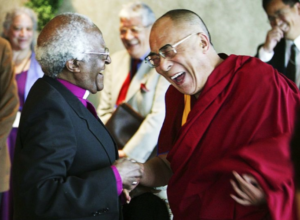
By the Rev. Chris Harris and Janice Lovchuk
This is the third in a series of blog posts are adapted from The Book of Joy by Archbishop Desmond Tutu and The Dalai Lama. Join us for our ongoing forum series on “The 8 Pillars of Joy” – Sundays at 9am on Zoom: https://zoom.us/j/410135064
Humor, the Third Pillar of Joy
“All the days of the oppressed are wretched, but the cheerful heart has a continual feast.”
-Proverbs 15:15
For the Dalai Lama and Archbishop Tutu, humor and laughter, particularly the ability to laugh at oneself, is the third pillar of joy. It is deeply related to the second pillar – humility – in that the ability to laugh at oneself and to not take ourselves so seriously, is in many ways an outward and visible sign of the grace that flows from humility. They may even be two sides of the same coin. Indeed, “’humor” and “humility” both come from the same Indo-European root — humus – or “earth” – which is also the root for the Latin word for ‘humanity.’ Humility and humor are the ways in which we remind ourselves that we are all come from the same basic substance and share a common humanity. We remind ourselves of this same truth on Ash Wednesday when we say, “Remember you are dust, and to dust you shall return.” Humor can bring us ‘down to earth.’
Humor brings joy by bringing us together
Laughter can help us accept the unexpected or unwanted twists and turns of life by bringing some new perspective and getting us out of our self-centered reaction to life. Our insecurities can cause us to put up a veneer of perfection and seriousness around others. Our default mode is often one of projecting an image that we have it all together – even if we don’t. It’s how we protect ourselves and our ego in an uncertain world. And while that is very natural, our guardedness also has the effect of keeping us distant from one another. As Christians, we are committed to building a world in which we see one another as our brother and our sister; a world where can tear down the walls that separate us so that we might be ‘one’ as the father and the son are one. (John 17:21) According to Archbishop Tutu humor helps us to see “our common humanity in many ways” and to coexist peacefully with others because it helps us to lower our guard. It can help put a much-needed pin in our puffed up egos put us back in the audience again, where we can laugh together at the absurdity of life.
Humor releases tension
Humor and laughter can also help to change a tense situation as it deflates and diffuses the atmosphere. The age-old practice of beginning lectures or speeches – even sermons — with a joke has its roots in this practice. Introducing ourselves to an audience there is a lot of tension; The speaker is not sure if they will accept us and the audience is not sure if they are going to prisoner to a speaker who might challenge, boor or insult them. A good, shared laugh releases that tension and helps us to relax by reminding us for that moment at least, that we are all in this together and we are all on the same team. It’s been said that laughing and crying are very similar in that they both serve to release tension and help us to feel better — it’s just that one is more fun than the other.
Humor and health
The Dalai Lama reminds us that, “People who are always laughing have a sense of abandon and ease. They are less likely to have a heart attack than those people who are really serious and have difficulty connecting with other people. Those serious people are in real danger. I met some scientists in Japan, and they explained that wholehearted laughter – not artificial laughter – is very good for your heart and your health in general.” Studies on humor are beginning to show that laughter boosts the immune system, relaxes the body, and protects the heart by lowering stress hormones which cause destructive inflammation.
Humor builds on relationship and trust
Ever wonder why we joke and tease our close friends in a way that we wouldn’t do with strangers? Throughout the book, Tutu and The Dalai Lama are endlessly teasing and laughing at one another be it about Dalai Lama’s broken English, or the Archbishop’s big nose or their respective tendencies to talk too much. They exude an ease in their relationship which arguably shouldn’t be there as they really don’t know one another all that well and have spent little time together. They point out that humor and laughter plays an important role in inter-personal relationships and can be “the most direct line between two people.” The good-natured teasing or ‘ribbing’ of one another, is a way in which we test the waters of our relationship as well as deepen it. When we joke with one another, we draw upon a reservoir of trust between us and is also surfaces that trust and puts it on display for both parties. We can learn through humor that our relationships are closer than we might have thought and can be a signal that the we are ready to go deeper in the friendship. As was pointed out in the forum discussion, it is a bit of a dance as well. We have all probably experienced that moment where a joke or gentle ribbing falls flat or is taken the wrong way because while we mistakenly thought the relationship was closer than it was. We might have been ready, but they just weren’t there yet.
we joke and tease our close friends in a way that we wouldn’t do with strangers? Throughout the book, Tutu and The Dalai Lama are endlessly teasing and laughing at one another be it about Dalai Lama’s broken English, or the Archbishop’s big nose or their respective tendencies to talk too much. They exude an ease in their relationship which arguably shouldn’t be there as they really don’t know one another all that well and have spent little time together. They point out that humor and laughter plays an important role in inter-personal relationships and can be “the most direct line between two people.” The good-natured teasing or ‘ribbing’ of one another, is a way in which we test the waters of our relationship as well as deepen it. When we joke with one another, we draw upon a reservoir of trust between us and is also surfaces that trust and puts it on display for both parties. We can learn through humor that our relationships are closer than we might have thought and can be a signal that the we are ready to go deeper in the friendship. As was pointed out in the forum discussion, it is a bit of a dance as well. We have all probably experienced that moment where a joke or gentle ribbing falls flat or is taken the wrong way because while we mistakenly thought the relationship was closer than it was. We might have been ready, but they just weren’t there yet.
Are we laughing with, or laughing at?
Just as humor can unite us, humor can also be used to divide us and to pit one group against another. We can probably all identify with moments in which we were bullied through the use of humor at our expense. Groups can unite against the “other” or a perceived “scapegoat” through humor just as powerfully as when we use humor to bring two sides together. Sarcasm for example, can be a personal attack disguised as humor. We have all seen people insult someone, only to fall back on the empty excuse, ‘I was just joking!’ For Tutu and The Dalai Lama, if humor is to bring us joy, it must bring us together and tear down walls that divide. When we are a bystander to humor that divides and pits us against one another, we need to notice it, and have the courage to name it and speak out against it.
What is your humor style?
Psychologist Rod Martin, published the Humor Styles Questionnaire, the first scientifically validated measure of humor (2003) in the Journal of Research in Personality. Martin and his team of researchers identified four basic humor styles that can help us understand how we use humor. Most of us draw from all four, so its not a matter of which one do we use, but which styles we tend to focus on. Although they don’t name them, Tutu and The Dalai Lama lift up the first two styles of humor: Affiliative and Self-Enhancing as styles of humor which lead to joy. If you would like to take a short test to learn what your humor style is, click here: https://www.thecut.com/article/whats-your-humor-style.html
Questions for further discussion:
Practicing humor and laughter
Are you able to laugh at yourself? When people joke with you or at you in a good-natured way, are you easily offended or prickly? Here are some practices to help you find your way to a deeper humility through humor.
If you would like to explore the practices of lasting joy, join us Sundays at 9am for our ongoing forum “The 8 Pillars of Joy” which will draw upon the wisdom of Archbishop Desmond Tutu and His Holiness the Dalai Lama. We will be using the best-selling book, “The Book of Joy” as our guide. Purchase the book here.
Questions, comments? Email Fr. Chris at charris@christchurchcranbrook.org